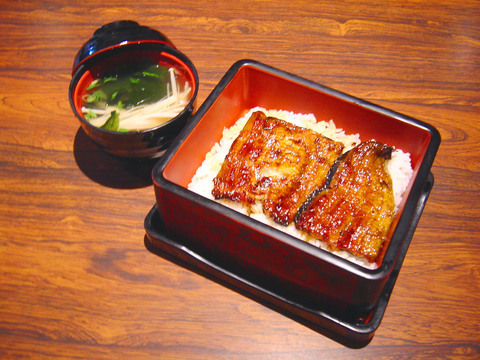If the fancy, high-end Japanese restaurants dotted across the capital are just too much for you, tucked away in the alley behind the intersection of Nanjing East Road and Jilin Road is Yu Xin Japanese Restaurant, a good place to go for a quick taste of Japan without breaking the bank.
Proprietor Zhang Ming-zhang (張明章) has more than 40 years of experience in Japanese cuisine and the restaurant business. Opened in 1997, the fine eatery long ago established a name for itself and attracts a steadily increasing number of patrons.
The authenticity of the food is proven by the number of Japanese customers who frequent the restaurant -- enough for the waiting staff to know how to take orders in Japanese.

PHOTO: HO YI, TAIPEI TIMES
Moderately decorated in a homey style, the joint can seat over a hundred customers with several private rooms for intimate gatherings. Though the menu is not huge, it is representative of traditional Japanese food. Here, you can order your favorite dishes from a selection that includes hot pot, fresh sashimi, charcoal grilled or steamed delicacies and vegetable and tofu dishes.
What makes this eatery stand out from the crowd is it signature eel rice bowl. According to Zhang, seven out of every 10 patrons order the famous grilled eel dish and those who have tasted it come back over and over again to get a fix. The key to this restaurant's popularity is word of mouth: freshly slaughtered eels and the specially made sauce, the ingredients of which Zhang prefers to keep secret.
Around 8am every morning, chefs begin preparing eels netted from the holding tank located behind the restaurant. The eels have to be grilled first then steamed in a wooden steamer. The eel meat is then grilled again until the it is saturated with the sauce's sweet flavor.
On weekdays, the joint can sell an average of 300 eel meals. On weekends, the number can jump to over 500. The good news is that you can sample the divine taste at the reasonable price of NT$140. The bad news is the dish is usually sold out before 8pm. Another must-try on the menu is hua sushi. For NT$340, you get a plate of eight super-sized hua sushi; enough to feed three people. Wrapped in baked egg strips, the restaurant doesn't skimp on tasty ingredients when making the sushi -- a gratifying mixture of fried shrimp, crab meat, asparagus, cucumber and shredded pork can be found in each bite.

April 28 to May 4 During the Japanese colonial era, a city’s “first” high school typically served Japanese students, while Taiwanese attended the “second” high school. Only in Taichung was this reversed. That’s because when Taichung First High School opened its doors on May 1, 1915 to serve Taiwanese students who were previously barred from secondary education, it was the only high school in town. Former principal Hideo Azukisawa threatened to quit when the government in 1922 attempted to transfer the “first” designation to a new local high school for Japanese students, leading to this unusual situation. Prior to the Taichung First

Chinese Nationalist Party (KMT) Chairman Eric Chu (朱立倫) hatched a bold plan to charge forward and seize the initiative when he held a protest in front of the Taipei City Prosecutors’ Office. Though risky, because illegal, its success would help tackle at least six problems facing both himself and the KMT. What he did not see coming was Taipei Mayor Chiang Wan-an (將萬安) tripping him up out of the gate. In spite of Chu being the most consequential and successful KMT chairman since the early 2010s — arguably saving the party from financial ruin and restoring its electoral viability —

The Ministry of Education last month proposed a nationwide ban on mobile devices in schools, aiming to curb concerns over student phone addiction. Under the revised regulation, which will take effect in August, teachers and schools will be required to collect mobile devices — including phones, laptops and wearables devices — for safekeeping during school hours, unless they are being used for educational purposes. For Chang Fong-ching (張鳳琴), the ban will have a positive impact. “It’s a good move,” says the professor in the department of

Article 2 of the Additional Articles of the Constitution of the Republic of China (中華民國憲法增修條文) stipulates that upon a vote of no confidence in the premier, the president can dissolve the legislature within 10 days. If the legislature is dissolved, a new legislative election must be held within 60 days, and the legislators’ terms will then be reckoned from that election. Two weeks ago Taipei Mayor Chiang Wan-an (蔣萬安) of the Chinese Nationalist Party (KMT) proposed that the legislature hold a vote of no confidence in the premier and dare the president to dissolve the legislature. The legislature is currently controlled